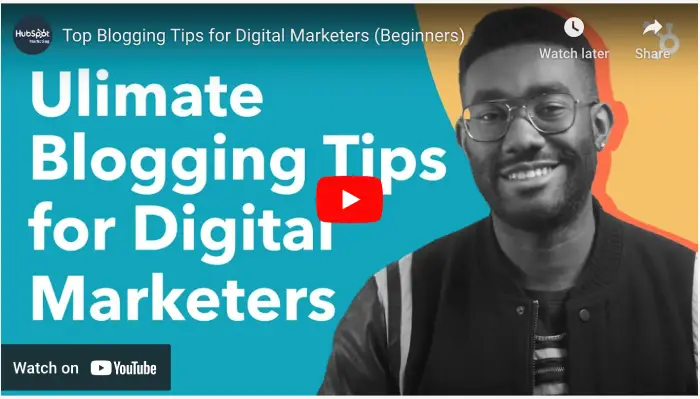Blogging is one of the most influential tools in the digital marketing landscape, providing a platform for businesses and individuals to share information, engage audiences, and drive growth.
This article explores the essence of blogging in digital marketing, its importance, types, and best practices, alongside addressing frequently asked questions.
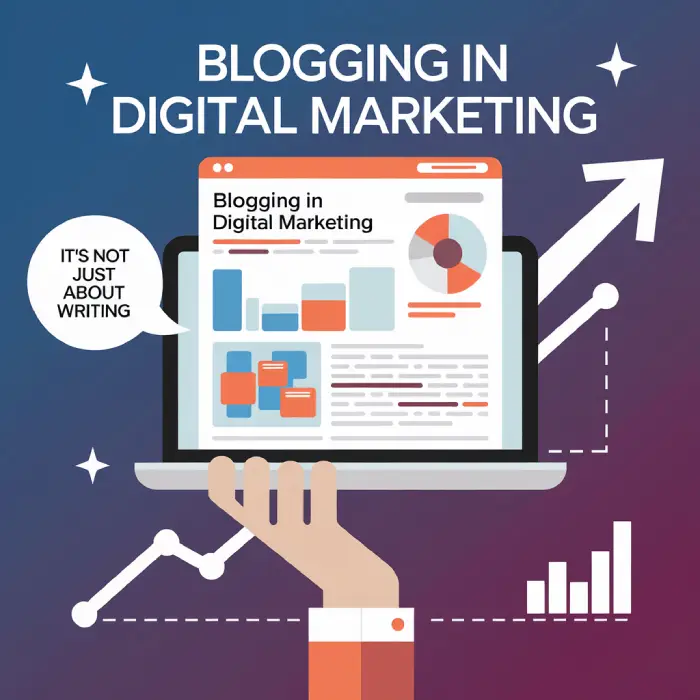
Introduction to Blogging in Digital Marketing
What is Blogging?
Blogging involves creating and publishing content in the form of articles or posts on a website, typically organized in reverse chronological order. Blogs are diverse, covering topics like technology, lifestyle, health, and more.
The Role of Blogging in Digital Marketing
Blogging is a cornerstone of digital marketing, helping businesses communicate with their target audience, boost website traffic, and establish authority in their niche.
It acts as a medium for content marketing, enabling brands to showcase expertise and build trust. To get started with digital marketing, check out our DSDM Digital Marketing Training Program.
Importance of Blogs in Digital Marketing
Why are Blogs Vital for Online Presence?
Blogs are essential for maintaining an active online presence. They:
- Provide fresh, relevant content for search engines.
- Engage and educate the audience.
- Establish a platform for thought leadership.
Benefits of Blogging for Businesses
- Improved SEO: Blogs target keywords and provide opportunities for backlinks.
- Lead Generation: Compelling content can convert readers into customers.
- Cost-Effective Marketing: Blogging requires minimal investment compared to paid ads.
Why is Blogging Important in Digital Marketing?
Driving Organic Traffic
High-quality blogs with targeted keywords improve search engine rankings, making it easier for potential customers to find your website.
Building Brand Authority and Trust
Consistently publishing informative content positions your brand as an industry leader, fostering trust among your audience.
Enhancing Customer Engagement
Blogs offer a platform for interaction, such as comments and social shares, creating opportunities to build relationships with your audience.
Helping to Get Product Sales and Leads
Blogs act as a soft-sell tool by showcasing products or services in a non-intrusive way. With compelling CTAs and value-driven content, they can drive sales and capture leads effectively.
Blogs can also earn money through avenues like Google AdSense and affiliate marketing, making them a versatile business tool.
Reducing Bounce Rate and Improving Internal Linking
Well-structured blogs encourage visitors to explore more pages by offering internal links to related content, thereby reducing bounce rates and keeping visitors engaged on your site.
Gaining Natural Backlinks
Creating high-quality, insightful content attracts backlinks from other websites. For instance, blogs like Backlinko and Neil Patel consistently publish in-depth guides and case studies that are often cited by others, earning them natural backlinks and strengthening their authority.
Types of Blogging in Digital Marketing
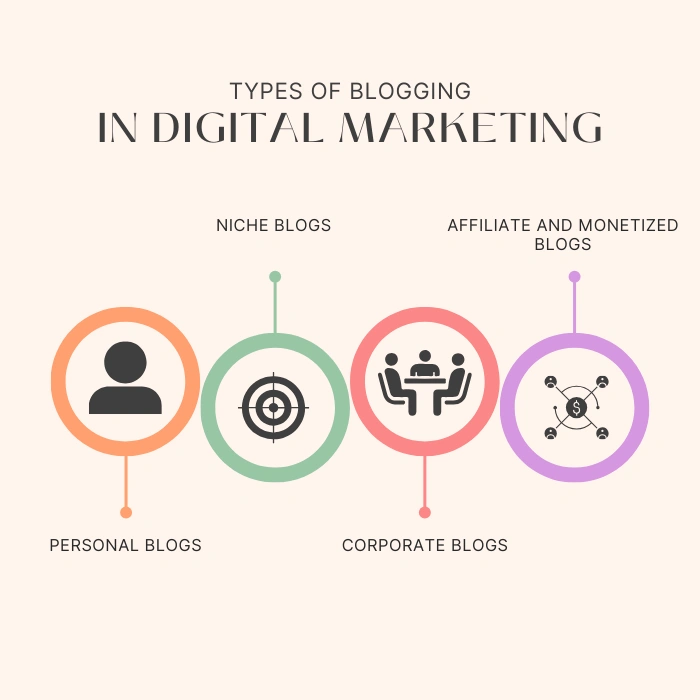
Personal Blogs
These reflect individual experiences and opinions, helping build a personal brand.
Niche Blogs
Focused on a specific topic, such as travel or fitness, to attract a targeted audience.
Event Blogs:
Event blogs are niche websites created around trending or upcoming events, festivals, or occasions. They aim to drive traffic through timely content, SEO, and social media promotion, often monetized via ads, affiliate links, or sponsorships.
Corporate Blogs
Managed by businesses to share updates, insights, and thought leadership.
Affiliate and Monetized Blogs
These generate income through affiliate marketing, ads, or sponsored content.
Key Elements of a Successful Digital Marketing Blog
Choosing the Right Niche
Select a niche that aligns with your expertise and audience needs
Writing High-Quality Content
Engaging, well-researched, and original content resonates with readers and ranks better on search engines.
SEO Optimization for Blogs
- Use relevant keywords.
- Optimize titles, meta descriptions, and headers.
- Include internal and external links.
How Blogging Fits into the Digital Marketing Strategy?
Content Marketing and Blogging
Blogs serve as the foundation for content marketing strategies by providing shareable and engaging material.
Blogging for Lead Generation
Including CTAs (Call to Actions) in blog posts encourages readers to subscribe or make purchases.
Integrating Blogging with Social Media Marketing
Blog posts can be shared on social platforms to drive traffic and boost engagement.
Best Practices for Blogging in Digital Marketing?
- Researching Keywords Effectively
Use tools like Google Keyword Planner and SEMrush to identify high-traffic keywords. - Structuring Content for Readability
Break content into sections with clear headings, bullet points, and visuals. - Using Analytics to Measure Blog Performance
Tools like Google Analytics can track metrics such as page views, bounce rates, and conversions.
Challenges in Blogging for Digital Marketing
- Content Saturation
Standing out in a crowded space requires unique and high-quality content. - Maintaining Consistency
Regular publishing schedules are critical to keep audiences engaged. - Measuring ROI from Blogs
Quantifying the impact of blogging on revenue can be complex.
How to Start Blogging for Digital Marketing?
- Setting Goals for Your Blog
Define clear objectives, such as driving traffic, generating leads, or building brand awareness. - Choosing the Right Blogging Platform
Popular platforms include WordPress, Blogger, and Medium. If you want to learn WordPress from scratch, enroll in DSDM WordPress Course to build professional-grade blogs - Creating a Content Calendar
Plan topics, publishing dates, and promotion strategies in advance.
Future of Blogging in Digital Marketing
Emerging Trends in Blogging
- Voice search optimization.
- Interactive content like quizzes and polls.
Impact of Ai on Blogging
- AI tools streamline content creation, research, and optimization processes.
Blogging For Niche Markets
- Focusing on underserved niches offers growth opportunities.
Real-Life Success Stories of Blogging in Digital Marketing
Examples of Brands Leveraging Blogs
HubSpot
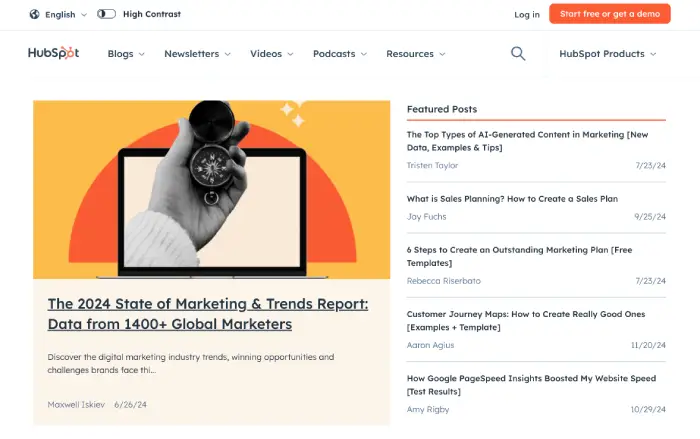
Moz
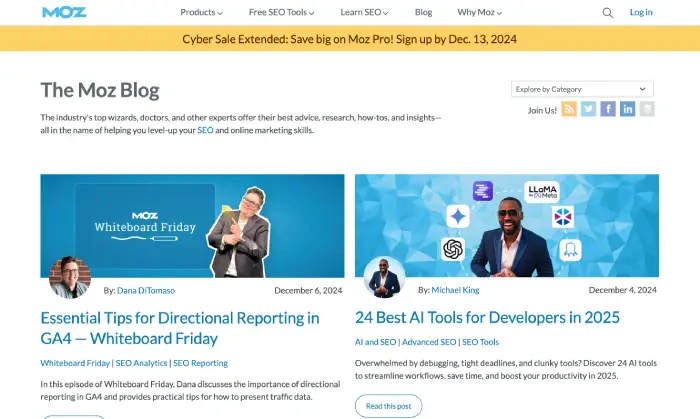
Key Takeaways from Successful Bloggers
- Consistency and quality matter.
- Engaging with the audience builds loyalty.
FAQs about Blogging in Digital Marketing
Blogging educates audiences, improves SEO, and drives organic traffic to websites.
Blogs target relevant keywords, provide fresh content, and attract backlinks.
Yes, blogs can drive sales, generate ad revenue, and promote affiliate products.
Consistency is key; posting weekly or bi-weekly is a good practice.
Popular tools include WordPress, Canva, Grammarly, and Google Analytics.
Yes, blogging is a subset of digital marketing, which encompasses various strategies like SEO, social media, and paid ads.
Yes, effective blogging relies on strong content writing skills to engage readers and optimize for SEO.
